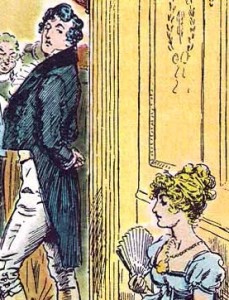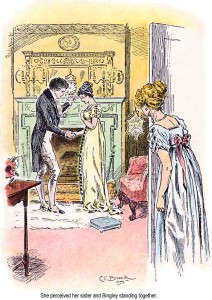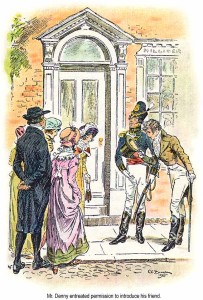I’m continuing Myretta’s Jane Austen theme today.
The Christian Science Monitor just published an article on the 200th anniversary of Pride and Prejudice, coinciding with Bath’s annual Jane Austen Festival. The title of the article is “Victorian-era soap opera turns 200: Pride and Prejudice still resonates today.”
Doesn’t that raise your hackles?
My goodness! First to call the book Victorian-era?
One could argue whether the book was Regency, because it was published in 1813, during the Regency, or whether it was Georgian, since Austen first wrote it in 1797, but it is lightyears from being Victorian in time-period and story! One wonders whether the journalist (or title writer) ever thought to check his research on that matter? Ironically, attached to the article is a a quiz about the United Kingdom (more on that later). I suspect the writers would not score well.
 Then to call Pride and Prejudice a soap opera? Wrong. Wrong. Wrong.
Then to call Pride and Prejudice a soap opera? Wrong. Wrong. Wrong.
The article compares the popularity of Downton Abbey to Pride and Prejudice. Now, I love Downton Abbey, but it is more a soap opera than Pride and Prejudice ever could be. Wikipedia defines a soap opera as: a serial drama, on television or radio, that features multiple related story lines dealing with the lives of multiple characters. The stories in these series typically focus heavily on emotional relationships to the point of melodrama.
Pride and Prejudice isn’t a series. True, the book has multiple characters with multiple story lines and is heavily focused on emotional relationships, but never never to the point of melodrama! Austen did not write melodrama. She wrote with a keen observation, wisdom, and wit about people, about their strengths and weaknesses, about how they could change and grow-through love.
 What’s more, Pride and Prejudice is considered one of the greatest books in literature. It regularly appears on lists of the greatest books of all time (except on one list I read yesterday and couldn’t find today to provide a link. And this list of 100 Must Read Books for Men- only one woman author there, Harper Lee’s To Kill A Mockingbird). Consider this quote from Anna Quindlen:
What’s more, Pride and Prejudice is considered one of the greatest books in literature. It regularly appears on lists of the greatest books of all time (except on one list I read yesterday and couldn’t find today to provide a link. And this list of 100 Must Read Books for Men- only one woman author there, Harper Lee’s To Kill A Mockingbird). Consider this quote from Anna Quindlen:
Pride and Prejudice is also about that thing that all great novels consider, the search for self. And it is the first great novel to teach us that that search is as surely undertaken in the drawing room making small talk as in the pursuit of a great white whale or the public punishment of adultery. (from Wikipedia)
Other than that, the article is pretty decent with some good observations from people who have the expertise to speak knowledgeably about the book.
It also includes a fun quiz – How Well Do You Know Pride and Prejudice? I scored only 80% mostly because I didn’t know enough about the film adaptations of the book. And I guessed Lizzie’s age wrong.
The article also links to another quiz – Keep calm and answer on: Take our United Kingdom quiz. I scored 80% on this one, too, mostly because I know Regency history, but not much else!
Take the quizzes and tell us how you do!
Do you think Pride and Prejudice is a soap opera?


I can see how a casual reader might mistake Pride & Prejudice for a soap opera. If you’re only reading for the plot, it’s pretty much about love and marriage and running off with the ne’er-do-well. But, of course it’s not a series. Nor can I imagine Downton Abbey have the enduring appeal of this book. I’m pretty sure people won’t be discussing it in 200 years.
On the other hand, referring to Jane Austen as Victorian enrages me. Thanks for the links, Diane.
I love Downton Abbey, but I agree with you. It is more soap opera than Pride and Prejudice is.
I suspect the author or title creator did not do their homework. Then again, I’ve noticed a lot of people refer to anything historical as Victorian. They aren’t familiar with Regency or Georgian. Now that I think about it, they seem to use Victorian interchangeably with Historical unless it’s a Western. P and P most definitely isn’t a soap opera; it isn’t a serial, and it ends happily ever after. It’s why I quit watching soaps.
I used to love soaps. There used to be a time I was addicted to General Hospital and All My Children.
Funny, when Amanda and I went on that tour of England and danced with the Jane Austen Dancers at the Assembly Room at Bath, the dancers were unfamiliar with the term Regency–but they would have called the era Georgian.
This is exactly what happened to me a couple months ago. A group of women asked me to be in their Victorian Book Club since I’ve read a lot of “old books” as they put it. Then their first choice was P&P. I put them straight and even said there were 3 monarchs between the time Austen wrote P&P and Queen Victoria, but they didn’t quite understand what I was getting at and didn’t want to split those hairs.
I can understand them, Miranda, but not a journalist! Although I much prefer to be a Regency snob about it all!!!
I prefer being a Regency snob too. 🙂
The only P&P question I missed was the one about the Oscar nominations. My brain refuses to accept that Knightly got an Oscar nom for that role. REFUSES! So 95%
I got the same score on the UK quiz. Not sure which question I missed there, as I thought I’d got them all correct. Which I DID now that I look, because it says I missed the first one, but I didn’t. Ireland is NOT part of the U.K. (N. Ireland is, but not Ireland). WTF?
I would have been shocked if you’d really missed that one, Isobel. Gosh. You can’t even trust a quiz!
That was the only one I missed too. I had no idea that Keira was nominated for that farce.
Ha! That’s like a “how many things are wrong with this sentence?” puzzle. 🙂 I also see red anytime I hear an Austen novel referred to as “Victorian”
I expect more from journalists!!!!
I followed this link today (25 September) and found a different headline and this note at the end of the article: “(The original headline of this story incorrectly described the novel as “Victorian.” The book was in fact published in the Georgian era).”
Typically, newspaper headlines are written by copy editors and not by the author of the article, so it could be him who first pointed out the mistake. I’ve known many journalists who were appalled by the headlines attached to their articles.